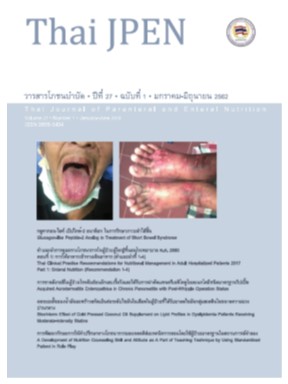กลูคากอน-ไลค์ เป็ปไทด์-2 อนาล็อก กับการรักษาภาวะลำไส้สั้น
คำสำคัญ:
เทดูกลูไทด์, ลำไส้สั้น, กลูคากอน-ไลค์ เป็ปไทด์, สารอาหารทางหลอดเลือดดำบทคัดย่อ
เทดูกลูไทด์ (teduglutide) เป็นกลูคากอน-ไลค์ เป็ปไทด์-2อนาล็อก ที่อนุมัติให้ใช้เพิ่มความสามารถของลำไส้ในการดูดซึมสารอาหารสำหรับผู้ป่วยอายุตั้งแต่1ปีขึ้นไปที่มีภาวะลำไส้สั้นและผ่านระยะลำไส้ปรับตัวหลังผ่าตัดมาแล้ว การศึกษาทางคลินิกระยะที่ 3ของteduglutide ฉีดใต้ผิวหนังขนาด 0.05 มก./กก./วัน เปรียบเทียบกับยาหลอกเป็นระยะเวลา 6เดือนในผู้ใหญ่ที่มีลำไส้สั้นและจำเป็นต้องได้รับสารอาหารทางหลอดเลือดดำ ผลพบว่าจำนวนผู้ป่วยที่สามารถลดปริมาตรการใช้สารอาหารทางหลอดเลือดดำได้ตั้งแต่ร้อยละ20ขึ้นไปจากปริมาตรสารอาหารทางหลอดเลือดดำที่ใช้เริ่มต้น ในกลุ่มที่ได้รับteduglutide มีมากกว่ากลุ่มที่ได้รับยาหลอกอย่างมีนัยสำคัญ รวมถึงมีจำนวนผู้ป่วยที่สามารถลดจำนวนวันที่ให้สารอาหารที่ให้ทางหลอดเลือดดำตั้งแต่1วันขึ้นไป ในกลุ่มที่ได้รับ teduglutide มีมากกว่ากลุ่มที่ได้รับยาหลอกอย่างมีนัยสำคัญ ความสามารถในการการดูดซึมของลำไส้ที่เพิ่มขึ้นและความต้องการสารอาหารที่ให้ทางหลอดเลือดดำที่ลดลงนั้นสามารถคงไว้ได้ในระยะเวลาหนึ่งหลังหยุดใช้ยา ผลการใช้ teduglutide ในเด็กก็ให้ผลเช่นเดียวกัน อาการไม่พึงประสงค์ที่พบ ได้แก่ ปวดท้อง ปวดเกร็งช่องท้อง ท้องอืด ท้องเสีย คลื่นไส้อาเจียน เป็นต้น อย่างไรก็ตาม teduglutide มีราคาแพงและยังไม่มีความคุ้มทุนจากผลการวิเคราะห์ความคุ้มทุนประสิทธิผลโดยใช้ผลการศึกษาเชิงคลินิกที่มีในปัจจุบัน มีรายงานว่าการใช้ teduglutide เพิ่มความเสี่ยงต่อการเกิด polypหรือมะเร็งในระบบทางเดินอาหาร จึงยังต้องการการติดตามความปลอดภัยในระยะยาวต่อไป
เอกสารอ้างอิง
Pironi L, Arends J, Baxter J, Bozzetti F, Peláez RB, Cuerda C, et al. ESPEN endorsed recommendations. Definition and classification of intestinal failure in adults. Clin Nutr. 2015;34(2):171-80.
Warner BW. The pathogenesis of resection-associated intestinal adaptation. Cell Mol Gastroenterol Hepatol. 2016;2(4):429-38.
Jeppesen PB. Teduglutide, a novel glucagon-like peptide 2 analog, in the treatment of patients with short bowel syndrome. Therap Adv Gastroenterol. 2012;5(3):159-71.
Rintala RJ, Pakarinen M, Wester T. Current Concepts of Intestinal Failure. AG, Switzerland: Springer International Publishing; 2016. ISBN 978-3-319-42551-1
Duggan CP, Jaksic T. Pediatric intestinal failure. NEJM. 2017;377(7):666-75.
Dimitriadis GK, Miras AD. Glucagon-like peptide-2 (GLP-2). In: Huhtaniemi I, Martini L, editors. Encyclopedia of Endocrine Diseases (Second Edition). Oxford: Academic Press; 2018. p. 561-4.
Brubaker PL, Anini Y. Direct and indirect mechanisms regulating secretion of glucagon-like peptide-1 and glucagon-like peptide-2. Can J Physiol Pharmacol. 2003;81(11):1005-12.
Warner BW. Adaptation: paradigm for the gut and an academic career. J Pediatr Surg. 2013;48(1):20-6.
Baldassano S, Amato A, Cappello F, Rappa F, Mulè F. Glucagon-like peptide-2 and mouse intestinal adaptation to a high-fat diet. J Endocrinol. 2013;217(1):11-20.
Hartmann B, Harr MB, Jeppesen PB, Wojdemann M, Deacon CF, Mortensen PB, et al. In vivo and in vitro degradation of glucagon-like peptide-2 in humans. J Clin Endocrinol Metab. 2000;85(8):2884-8.
Marier JF, Beliveau M, Mouksassi MS, Shaw P, Cyran J, Kesavan J, et al. Pharmacokinetics, safety, and tolerability of Teduglutide, a Glucagon-Like Peptide-2 (GLP-2) Analog, Following Multiple Ascending Subcutaneous Administrations in Healthy Subjects. J Clin Pharmacol. 2008;48(11):1289-99.
Burness CB, McCormack PL. Teduglutide: A review of its use in the treatment of patients with short bowel syndrome. Drugs. 2013;73(9):935-47.
McKeage K. Teduglutide: A guide to its use in short bowel syndrome. Clin Drug Investig. 2015;35(5):335-40.
Kim ES, Keam SJ. Teduglutide: A review in short bowel syndrome. Drugs. 2017;77(3):345-52.
European Medicine Agency. Revestive: EPAR product information; summary of product characteristics. 2018 [cited 2019/01/09]. Available from: https://www.ema.europa.eu/documents/product-information/revestive-epar-product-information_en.pdf
Jeppesen PB, Gilroy R, Pertkiewicz M, Allard JP, Messing B, O'Keefe SJD. Randomised placebo-controlled trial of teduglutide in reducing parenteral nutrition and/or intravenous fluid requirements in patients with short bowel syndrome. Gut. 2011;60(7):902-14.
Jeppesen PB, Pertkiewicz M, Messing B, Iyer K, Seidner DL, O'Keefe SJD, et al. Teduglutide reduces need for parenteral support among patients with short bowel syndrome with intestinal failure. Gastroenterology. 2012;143(6):1473-81.
Schwartz LK, O’Keefe SJD, Fujioka K, Gabe SM, Lamprecht G, Pape U-F, et al. Long-term teduglutide for the treatment of patients with intestinal failure associated with short bowel syndrome. Clin Transl Gastroenterol. 2016;7:e142.
Seidner DL, Fujioka K, Boullata JI, Iyer K, Lee H-M, Ziegler TR. Reduction of parenteral nutrition and hydration support and safety with long-term teduglutide treatment in patients with short bowel syndrome-associated intestinal failure: STEPS-3 study. Nutr Clin Prac. 2018;33(4):520-7.
Iyer KR, Kunecki M, Boullata JI, Fujioka K, Joly F, Gabe S, et al. Independence from parenteral nutrition and intravenous fluid support during treatment with teduglutide among patients with intestinal failure associated with short bowel syndrome. JPEN J Parenter Enteral Nutr. 2017;41(6):946-51.
Jeppesen PB, Gabe SM, Seidner DL, Lee H-M, Olivier C. Factors associated with response to teduglutide in patients with short-bowel syndrome and intestinal failure. Gastroenterology. 2018;154(4):874-85.
Ukleja A, Alkhairi B, Bejarano P, Podugu A. De novo development of hamartomatous duodenal polyps in a patient with short bowel syndrome during teduglutide therapy: A case report. JPEN J Parenter Enteral Nutr. 2018;42(3):658-60.
Rudzki S, Armstrong D, Jeppesen PB, Forbes A, Lee HM. MON-P083: Post HOC analysis of polyps in 9 short bowel syndrome patients treated with teduglutide. Clin Nutr. 2016;35:S183-S4.
Carter BA, Cohran VC, Cole CR, Corkins MR, Dimmitt RA, Duggan C, et al. Outcomes from a 12-Week, open-label, multicenter clinical trial of teduglutide in pediatric short bowel syndrome. J Pediatr. 2017;181:102-11.e5.
Vipperla K, O'Keefe SJ. Targeted therapy of short-bowel syndrome with teduglutide: the new kid on the block. Clin Exp Gastroenterol. 2014;7:489-95.
Shire. Study in Japanese pediatric subjects with short bowel syndrome (SBS) who are dependent on parenteral support. [cited 19 April 2019]. Available from: https://clinicaltrials.gov/ct2/show/NCT02980666.
Shire. A study in Japanese children with short bowel syndrome who completed SHP633-302. [cited 19 April 2019]. Available from: https://clinicaltrials.gov/ct2/show/NCT03268811.
National Centre for Pharmacoeconomics. Cost-effectiveness of teduglutide (Revestive®) for the treatment of patients aged one year and above with short bowel syndrome. 2018 [cited 2019/01/10]. Available from: http://www.ncpe.ie/wp-content/uploads/2017/04/Summary-for-website-16.03.2018.pdf.
ดาวน์โหลด
เผยแพร่แล้ว
รูปแบบการอ้างอิง
ฉบับ
ประเภทบทความ
สัญญาอนุญาต
เนื้อหาและข้อมูลในบทความที่ตีพิมพ์ลงใน Thai JPEN วารสารโภชนบำบัด ถือเป็นข้อคิดเห็นและความรับผิดชอบของผู้เขียนบทความโดยตรงซึ่งกองบรรณาธิการวารสารไม่จำเป็นต้องเห็นด้วยหรือร่วมรับผิดชอบใด ๆ
บทความ ข้อมูล เนื้อหา รูปภาพ ฯลฯ ที่ได้รับการตีพิมพ์ใน Thai JPEN วารสารโภชนบำบัด ถือเป็นลิขสิทธิ์ของ Thai JPEN วารสารโภชนบำบัด หากบุคคลหรืหน่วยงานใดต้องการนำทั้งหมดหรือส่วนใดส่วนหนึ่งไปเผยแพร่หรือเพื่อกระทำการใด จะต้องได้รับอนุญาตเป็นลายลักษณ์อักษรจาก Thai JPEN วารสารโภชนบำบัด ก่อนเท่านั้น



